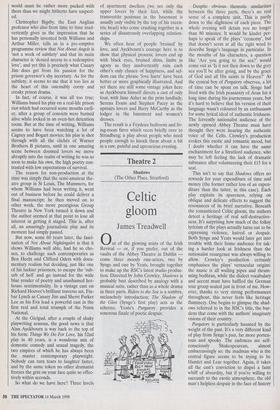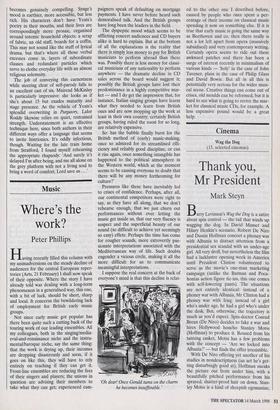Theatre 2
Shadows
(The Other Place, Stratford)
Celtic gloom
James Treadwell
Out of the glowing mists of the Irish Revival — or, if you prefer, out of the vaults of the Abbey Theatre in Dublin come three moody one-acters, two by Synge and one by Yeats, brought together to make up the RSC's latest studio produc- tion. Directed by John Crowley, Shadows is probably best described by analogy with a musical suite, rather than as a whole drama in three parts. Riders to the Sea is a sombre, melancholy introduction; The Shadow of the Glen (Synge's first play) acts as the scherzo; Yeats's Purgatory provides a sonorous finale of poetic despair. Despite obvious thematic similarities between the three parts, there's no real sense of a complete unit. This is partly down to the slightness of each piece. The whole evening will detain you no longer than 80 minutes. It would be kinder per- haps to speak of the plays"economy', but that doesn't seem at all the right word to describe Synge's language in particular. In the mouths of his characters, a question like 'Are you going to the sea?' would come out as 'Is it not then down to the grey sea you'll be after going, and by the grace of God and all His saints in Heaven?' As the cynical boy of Purgatory observes, a lot of time can be spent on talk. Synge had lived with the Irish peasantry of Aran for a long time during his journeyman years, but it's hard to believe that his version of their language wasn't coloured by an enthusiasm for some lyrical ideal of authentic Irishness. The fervently nationalist audience of the newly opened Abbey Theatre must have thought they were hearing the authentic voice of the Celts. Crowley's production evokes this exotic and romantic mood, but I doubt whether it can have the same enchantment for a Stratford audience, who may be left feeling the lack of dramatic substance after volunteering their £15 for a seat.
This isn't to say that Shadows offers no rewards for your expenditure of time and money (the former rather less of an expen- diture than the latter, in this case). Each play exploits its spareness, relying on oblique and delicate effects to suggest the resonances of its brief narrative. Beneath the romanticised Celtic gloom, the authors detect a heritage of real self-destructive- ness. It's surprising how much of the folksy lyricism of the plays actually turns out to be expressing violence, hatred or despair. Both Synge and Yeats would later get into trouble with their home audience for tak- ing a harder look at Irishness than the nationalist resurgence was always willing to allow. Crowley's production certainly emphasises the plays' vernacular origins: the music is all wailing pipes and thrum- ming bodhran, while the dialect vocabulary and accent must have baffled the German tour group seated just in front of me. How- ever, thanks to very strong performances throughout, this never feels like heritage flummery. One begins to glimpse the shad- ows referred to in the RSC's title, the bur- dens that come with the authors' imaginary visions of their country.
Purgatory is particularly haunted by the weight of the past. It's a very different kind of play from Synge's pair, far more porten- tous and spooky. The cadences are self- consciously Shakespearean, almost embarrassingly so: the madman who is the central figure seems to be trying to be Hamlet and Lear together. Again, it takes all the cast's conviction to dispel a faint whiff of absurdity, but if you're willing to succumb to the exotic atmosphere, the old man's helpless despair in the face of history becomes genuinely compelling. Synge's mood is earthier, more accessible, but less rich. His characters don't have Yeats's poetry in their mouths, and their lives are correspondingly more prosaic, organised around totemic household objects: a scrap of fabric, an old staff, boards for a coffin. This may not sound like the stuff of lyrical drama, but that's where all those verbal excesses come in, layers of subordinate clauses and redundant particles which serve to clothe everyday life with an almost religious solemnity. The job of conveying this earnestness while steering clear of self-parody falls to an excellent cast of six. Mairead McKinley is particularly impressive: she looks as if she's about 15 but exudes maturity and stage presence. As the vehicle of Yeats's splendid overwriting in Purgatory, Lalor Roddy likewise relies on quiet, restrained strength. Understatement is an effective technique here, since both authors in their different ways offer a language that seems to invite histrionics. It's oddly infectious, though. Waiting for the late train home from Stratford, I found myself rehearsing the appropriate rhapsody: 'And surely it's delayed I'm after being, and me all alone on the grey platform with not a living soul to bring a word of comfort, Lord save us .



































































 Previous page
Previous page